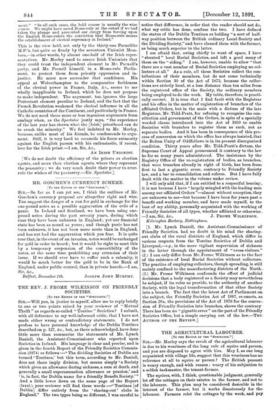THE AGRICULTURAL LABOURER.
[TO THE EDITOR OF THE "SPECTATOR."]
SIR,—Mr. Morley says the revolt of the agricultural labourer- is due to his weariness of the long rule of squire and parson; and you are disposed to agree with him. May I, as one long acquainted with village life, suggest that this weariness has no reference at all to squire or parson ? The British peasant is weary enough, and with reason ; weary of his subjection to a selfish taskmaster, the tenant-farmer.
The squires, with, I think, questionable judgment, generally let off the cottages on their estates to the farmer, and not to the labourer. This plan may be considered desirable in the interest of the farmer, but it works disastrously for the labourer. Farmers relet the cottages by the week, and pay their labourers by the day or the piece. "I shan't want you ; you may go home," is too frequently the welcome a labourer receives at 6 o'clock on a wet morning. This repeated day after day during a rainy season brings poor Hodge and family into debt or starvation. He looks about him for a job else- where, succeeds possibly, but soon finds himself face to face with an angry landlord. ‘. You live here as my workman. If you are out of the way when I want you, I shall got another tenant." Thus power over his labourer's home is held and most unfairly used by the master, who, naturally an unimagina- tive person, wrapped up in his own anxieties, and looking upon the low estate of the poor farm-servant as only reasonable and fitting, since it has always been as it is, does not for a moment consider himself as using an unjust coercion.
Since the depression" set in, the iron hand has come down still more heavily upon the farm-labourer. He and the squire have pretty well shared the loss between them. The farmer has taken care of that. He was, luckily for him, in a position to do so; for while on the one hand he obtained heavy dis- counts on rent, on the other be spared no effort to keep down the wages-bill. Throughout the West of England, farm-roads, fences, pools, bartons, tell the passer-by the tale of a struggle against a cycle of unfertile seasons largely at the expense of the labouring staff.
Well, Sir, here you have the true cause of the farm- labourer's weariness. The squire and the parson are not obnoxious to him. He knows them to be warm and active friends ; and it is certain that unless a strong feeling inter- vened, he would be guided in his use of the franchise by their example and counsel. But great prejudice exists in his mind against his master, who equally with squire and parson is a traditional Tory ; and the opportunity of recording a secret vote in opposition to his "natural enemy," is a pleasant thought. There, for once, is a chance of paying off old scores : it is felt like that. He realises nothing as yet of the sacred- ness of the vote-trust, but only the intoxication of a new power which he can use as he likes. Who that understands human nature will doubt how it will be handled P—I am, Sir, &c.,
R. S. PHILPOTT.











































 Previous page
Previous page